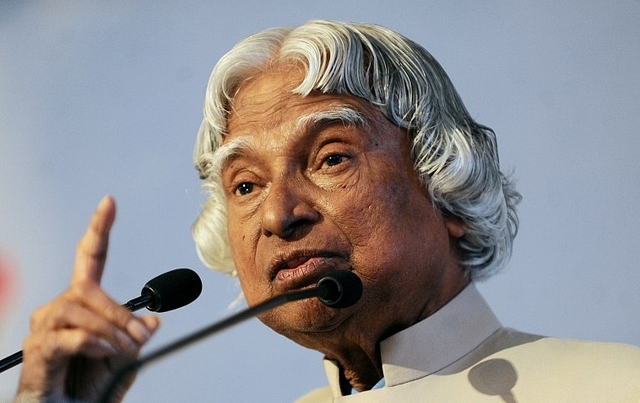
Real Tribute To Dr Kalam: 70 Percent Development Politics
Ensuring the functioning of Parliament is the best tribute that can be given to Dr Kalam.
As I recall the legacy of our former President Dr APJ Abdul Kalam, I particularly remember his famous address to both the Houses of the Parliament as President, when he unveiled his “vision 2020” to make India an economically developed nation. He earnestly encouraged the honourable Members of Parliament to devote 70% of the time to development politics, and 30% of the time to their and their parties’ politics. Unfortunately, the situation at present does not show healthy signs for the country and is not in conformity to what Dr Kalam envisioned for the nation.
Of late, the Parliament has not been functioning effectively. In fact as per a PRS survey conducted on the functioning of the 15th Lok Sabha (2009-2013), the Lok Sabha lost 42% of the total time, while Rajya Sabha lost 20% due to adjournments. The Question Hour was conducted for 13% of the scheduled time in Lok Sabha and 29% in Rajya Sabha. The annual number of hours of sitting of the Parliament has reduced from 3500 hours in the 1st Lok Sabha to meagre 400 hours in the 15th Lok Sabha. In other countries like The US, Congress sat for 159 days vis a vis the Indian Parliament sitting for 60 days on an average in 2013. As per official estimates, each minute of running the Parliament will cost the exchequer (taxpayer’s money) Rs 2.5 lakh.
Further an estimate by Times Of India, predicts a washout monsoon session costing 260 crores. This is certainly not a situation that makers of the constitution had envisioned, especially when I read the insightful sessions without any interlude culminating into realizing the political, social and economic aspirations of the people in form of the Constitution.
The opposition parties justify the situation, by the act of disruption committed by the party in government during their time in treasury resulting in the political loss they had to suffer. Such justifications should not go down as precedents, and the parties should rise above short-term political gains for long term shared national developmental gains. The opposition party should change disruption precedents and set the tone for a strong, mature opposition countering the government, and holding it accountable on the floor of the House through strong points in debate.
The floor of the House should be only meant for debate, not disruption. There is no doubt that when the Parliament debates ,the nation follows. The credibility of a Member increases more by a valid point than by committing an act of disruption. The voter no longer has a short-term memory. He/she keenly observes the conduct and performance of the legislature over a period of time; particularly the youth, which is emerging as the “new vote bank”.
Further, it might be a wrong political calculation to expect short-term incentives announced ahead of the election year as the key to winning elections any longer. Pointedly, the recent national and state elections have highlighted this point. However, if the realization does not work as a solution, certain enforceable steps can act as means to counter disruption along with sufficient public pressure.
First of all, the salary of the Member of Parliament (MP) can be deducted as per the number of hours of Parliament time disrupted by the particular MP. Perhaps an alternate route can be to collectively deduct the salary of all Members of Parliament irrespective of who disrupts. This might ultimately help other members of the same party to convince party leaderships against disruption.
In addition, the cost of the disruption should be estimated by the Public Accounts Committee, and the respective political party of the member should be liable to pay the money. The money can go into a separate fund, or the Contingency fund and be used for welfare and relief measures.
Secondly, a less radical option might be to truncate the cost of disruption as per a revised formula from the Member’s MPLAD (Member Of Parliament’s Local Area Development) fund and transfer it into a separate fund which can be used for development works in the same constituency but not through the member.
For example, devolving the money for Swachh Bharat Kosh in the same district can be an option to explore. Alternatively, the money can also be transferred to the best performing MP from the unruly Member’s political party. The Parliament can form a committee to devise parameters for judging the performance of the MP’s. This should be done in a scientific manner. A way out for selection is to vote the best performing members as per closed ballot with FPTP method (First Past the Post). Moreover for this particular vote, rules of procedure can be amended to dilute the option to exercise the whip.
Lastly, the easiest of all options is to amend the rules of conduct to prevent the use of cards, boards and stooping in the well by listing them as situations amounting to automatic suspension by the Speaker. The discretion of the Speaker to decide on suspension in this particular situation should not be an option available in the rules. Such an act, if repeated without reasonable explanation, in extreme situations can amount to termination of the membership. Termination should be recommended by the Ethics Committee of the House and passed by a special majority (2/3rd present and voting ).
Taking a vow to ensure the functioning of the House is the best tribute to Dr Kalam that can be given. Even on his journey to IIM Shillong he was worried about the continuous disruption of the Parliament (as per the article published by his aide). Quoting the people’s President, our former President – “Don’t declare holiday on my death, instead work an extra day, if you love me”.